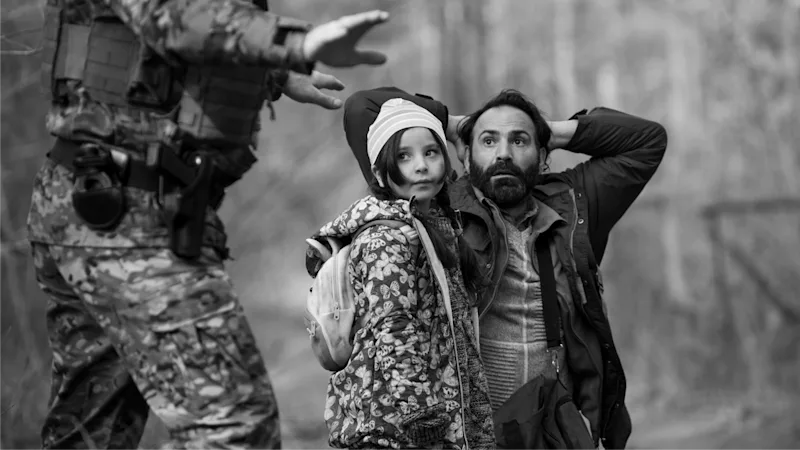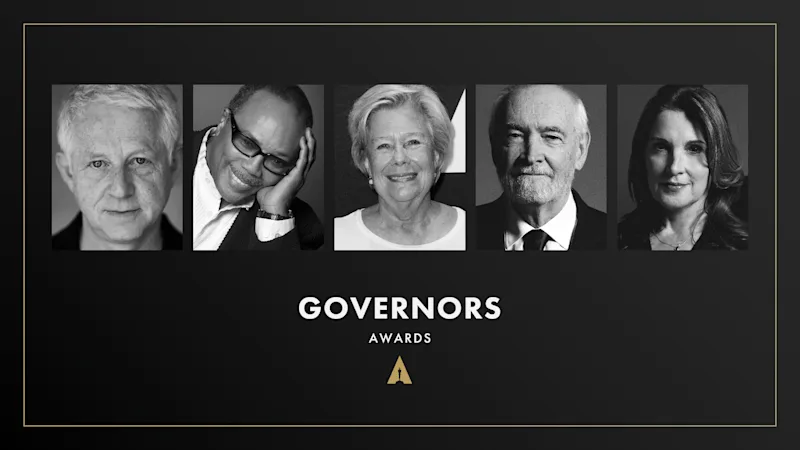When An Cailín Ciúin, known abroad as The Quiet Girl, received a nomination for Best International Feature Film at the 95th Oscars, it was Ireland's first submission to do so. That alone meant to the world to writer-director Colm Bairéad. "I grew up watching the Oscars," the Dublin-born filmmaker says. "You would watch the TV and dream about, 'Oh, wouldn't it be wonderful to be there one day?' It's the stuff of dreams, really."
"But it also means a great deal to Irish people, because this is the first time an Irish-language feature film has ever been nominated for an Academy Award," notes Bairéad, who was raised bilingually by this Irish-speaking father and English-speaking mother. "The Irish language is our official language in Ireland, but unfortunately, it's a minority language in our country and it's an endangered language. So, moments like this, where the Irish language is given a platform and is enjoying this level of success, are really important in terms of the preservation of the language. It strikes a chord with Irish people in terms of national pride and who we truly are; this was the language that we, as a people, used to speak."
The Quiet Girl is a largely faithful adaptation of award-winning Irish writer Claire Keegan's short story, Foster, with one noteworthy amendment: The story was written in English, and Bairéad's adaptation is in Irish. Set in 1981, the drama follows 9-year-old Cáit (newcomer Catherine Clinch) as she is sent to spend the summer with distant relatives. Her mother is pregnant, her father is indolent, and their home is already overcrowded with children, so Cáit is offloaded onto a childless couple (Carrie Crowley and Andrew Bennett), in whose care the young girl comes into her own.
"It's been a big news story back home," Bairéad says from L.A., where he was recently in attendance at the annual Oscars Nominee Luncheon. This year's class comprises a "green wave" of nominees with ties to the Emerald Isle, including the cast of The Banshees of Inisherin, Aftersun's Paul Mescal, Avatar: The Way of Water's Richard Baneham (up for Best Visual Effects), Elvis' Jonathan Redmond (Best Film Editing), and the nominated live action short film, An Irish Goodbye. "It's like your family is there with you, because we all gravitate towards each other and everyone's just so happy for everyone else," Bairéad tells A.frame. "It's been a great year for Irish cinema."

A.frame: How did Claire Keegan's Foster come to you, or you to it?
I read an article in The Irish Times in 2018, it was a list of the 10 best works of Irish literature by female authors this century, and Foster was on that list. I'd read some of them already, but I hadn't read Foster. So, I went out that day and I bought it, and it's really small. It's a long short story, that's how Claire likes to describe it. I read it in 40 minutes or something, and I was just floored by it. I was in tears at the end. I'd been so moved by every aspect of it. And I loved the fact that it was centered on this young consciousness.
The entire story is filtered through the eyes, and the ears, and the mind, and the heart of this young girl, and it felt so immersive and compassionate. I had become a father a year before that, and Cleona [Ní Chrualaoí], who's the producer of the film and my wife, she was actually pregnant with our second child, so we were really in the thick of being parents. As a new parent, you get a really deep understanding of what it is that a child needs and just the love that you feel for that child. And to encounter this young child, even though it's a fictional child, who's not receiving all of these things that she's yearning for, I had a really sort of paternal response to the character and wanted to take care of her in a sense.
What was it about Foster that made you want to adapt it as a movie?
All of my short films had focused on young protagonists as well, and I have a great love of cinema that deals with childhood. And Foster is just a beautiful portrait of us as a people. It captures the Irish so well and felt so authentic to me. At the time, I was actively looking for material to write an Irish-language feature film, because there had been a new scheme announced in Ireland to fund Irish-language cinema. My history with the Irish-language goes back to birth, really. My dad only ever spoke Irish to me. He still has never spoken English to me all my life. And all my short films prior to this had been in the Irish language as well. So, I was looking for something to submit to this new scheme. And I read Foster, and even though that's an English-language text, I could see how you could very easily transplant the action of the story to an Irish-language setting — because the Irish language is only spoken as a working language in rural areas and very small pockets in Ireland. I could see how you could move the story into one of those regions and still be truthful to everything that Claire created, and you wouldn't be betraying the essence of what she had created at all. It just felt like this perfect material for me.
You've spoken about how important it was to you that the film be in the Irish language, and I wondered if that was something that you had to fight for. But it seems like that is the reason you were able to make the movie in the first place.
Absolutely. The language, in a strange way, afforded me an opportunity. This scheme sort of appeared out of nowhere and suddenly there was an opportunity for someone who was an Irish-speaking filmmaker to make a film. Because prior to that particular scheme being set up, you could pretty much count on one hand the number of Irish-language feature films that had ever been released theatrically in the history of cinema in Ireland. There was this silence, you know what I mean, in that our own language hadn't been represented in our national cinema. This scheme was a sort of corrective to that. And it's been wonderful. It's led to some of the more interesting films that have come out of Ireland in recent years.

You mentioned that much of your work has centered on young protagonists. What have you found is your secret to working with young — in this case first-time — child actors?
I think you cast the right one. That certainly helps. [Laughs] Catherine's similar enough to the character in some ways, but she's also got this extraordinary emotional intelligence of her own. She's hyper intelligent and had a very deep understanding of this character from the get-go. She's just this remarkable performer, and had this deep understanding of how this character would feel in any given moment. It was really remarkable. People were constantly looking at the monitor, and then, at the end of a take, we'd all turn to each other and go, 'Oh my God, this girl is incredible.'
She was our guiding light in the making of the film, to the point that there were times when you're working with someone at that age, they can only work seven and a half hours is the Irish limit. So, we'd have two and a half hours every day to fill, which is really tricky because she's in every scene in the movie. We'd have to shoot her coverage coming towards her wrap time, and then she'd wrap and she'd be gone, and we'd have to shoot the other actor's coverage to shoot out the rest of the scene. We had a double that we could put in there for them to play off for eye lines and stuff, but the actors, Carrie and Andrew, they actually asked not to use the double. Because they were so mesmerized by what Catherine had done that the memory of it was enough for them to play off. So, oftentimes in their singles, they're looking at a piece of gaffer tape for their eye line, and then they're literally working off the memory of what Catherine had done maybe 30 minutes before that. Which, to me, is remarkable. It's a real testament to their performances, that they were able to do that, but also testament to the extraordinary potency of what Catherine created.
The film is obviously set in Ireland, and it is in the Irish language, but do you think there is something about the story of The Quiet Girl that is uniquely or quintessentially Irish?
Well, the central kind of conceit of it — this notion of sending a child away from their biological family home for an extended period — that's a sort of social phenomenon that was very much part of the fabric of Irish society in times past. Irish families were bigger. There was no contraception. It was a very Catholic country, so 'keep making children' was the mantra. You had families that were essentially overcrowded and overpopulated in a way, and just the general attitude towards children was different to what it is today. They were expected to be seen and not heard, and I guess that's the thing that's really specifically Irish about it. That's something that we used to do as a people. That's the reason you couldn't really tell this story now, because that doesn't happen anymore.
But the fundamental elements of the story are universal. I've always said that I believe you could tell this story pretty much in any country. You could place it in, I don't know, a farm in the U.S. or in the Outback in Australia or in Africa someplace. And each of those versions of the story would have their own cultural specificity based on wherever they are, but the fundamental elements of it would remain the same, because it has this universal quality to it. And we knew that when we set out to make this film. We were like, 'Okay, we're making a profoundly Irish film.' But we also knew that there is a potential for this film to travel beyond our own shores if we were successful in capturing the essence and the heart of what Claire had created in Foster. Because Foster itself has been translated into so many languages, so that's a testament to its universality, that it works for different people across different cultures.
And your film has traveled, far, far from your shores.
It's been pretty amazing. We're feeling pretty good.
RELATED CONTENT:
With 'Close,' Lukas Dhont Wants to Break the Cycle of Toxic Masculinity (Exclusive)
'Donkey Ruled the Set': Jerzy Skolimowski Reflects on the Making of 'EO' (Exclusive)






